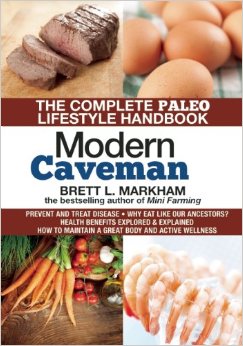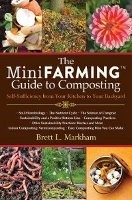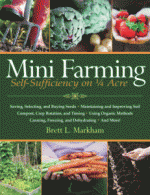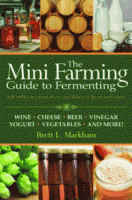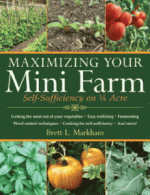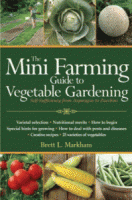Dehydrating is probably the oldest method of food preservation. The foods will keep for years, lend themselves well to making your own convenience foods, and will keep even if you have no electricity
I have been dehydrating foods for 20 years, starting when I was down on my luck and had to live on a $30/week food budget. Now I do it because it helps me process large harvests and helps me make some of the best convenience foods! I covered the essentials of dehydrating in MiniFarming: Self-Sufficiency on 1/4 Acre, but The Dehydrating Bible goes into a lot more depth.
This book covers the how and why, including the science that underlies dehydrating. It describes everything you need to know about pre-treatments, marinades, storage and more. But just like in my other books, I don’t just tell you “what to do.” Instead, I explain the underlying principles and ideas so you have the knowledge to create your own marinades and recipes and handle situations that might not be specifically covered in the book.
The Dehydrating Bible covers proper and safe preparation, pre-treatment and dehydrating of fruits, vegetables and meats. But it also covers herbs and spices, and has a chapter dedicated to step-by-step instructions for building a cost-effective dehydrator large enough to handle big harvests. I give a lot of helpful hints that come from long hands-on experience so you’ll be an expert yourself in no time.
But the most useful feature of the book, the aspect you’ll likely use the most, is the section of recipes for making your own soups, stews, salad dressing mixes, and convenience foods like instant oatmeal and instant mashed potatoes.
A long time ago, I was living pretty much hand-to-mouth and I would do most of my cooking in a thermos. I grew vegetables in a secret plot under some high voltage lines. I couldn’t always afford to keep my electricity on. Over time, I developed a ton of recipes for making and combining dehydrated foods to make delicious and healthful meals. The food was so good, even today my daughter sometimes asks for me to make it for her.
I’m not living hand to mouth these days, but the recipes remain and are just as good — and I share them with you in the book.
If you have undertaken Mini-Farming, you likely have some really large harvests to handle. The large-scale dehydrator I describe in the book can have twice the capacity of the largest countertop dehydrators and costs less than half as much to build. Combined with canning, freezing and pickling, this will help you put away a lot of veggies in a short time!
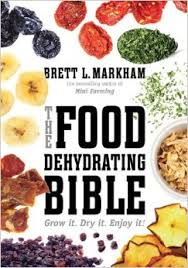 The Food Dehydrating Bible is available from Amazon, Barnes and Noble, Indie Bound and independent bookstores.
The Food Dehydrating Bible is available from Amazon, Barnes and Noble, Indie Bound and independent bookstores.
Filed under: Books, Diet, Emergency preparedness, Food Preservation


